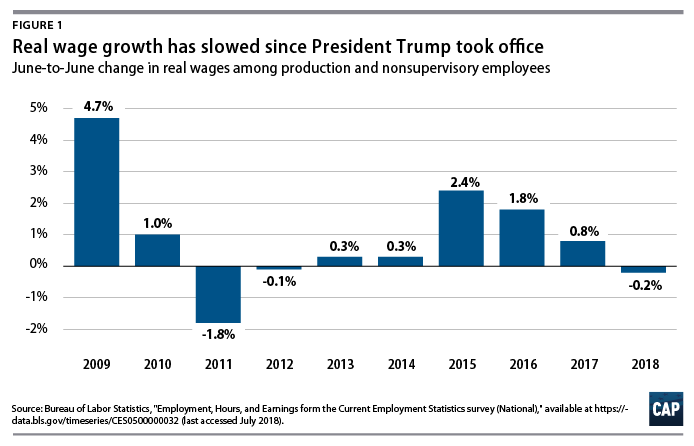Welcome to DU!
The truly grassroots left-of-center political community where regular people, not algorithms, drive the discussions and set the standards.
Join the community:
Create a free account
Support DU (and get rid of ads!):
Become a Star Member
Latest Breaking News
Editorials & Other Articles
General Discussion
The DU Lounge
All Forums
Issue Forums
Culture Forums
Alliance Forums
Region Forums
Support Forums
Help & Search
General Discussion
Related: Editorials & Other Articles, Issue Forums, Alliance Forums, Region ForumsGDP Is Growing, but Workers' Wages Aren't
Even as Republicans plunge the Country deeper into debt to goose the GDP, American workers are losing ground under Trump close to a decade after the Great Recession. Note in the graph that in 2011, House Republicans instituted austerity measures after winning control of Congress even as the Nation was climbing out of recession. In sharp contrast, even as the Nation is near full employment, Republicans passed massive tax cuts under Trump, which benefit the rich but with no real benefit to workers.
https://www.americanprogress.org/issues/economy/reports/2018/07/26/454087/gdp-growing-workers-wages-arent/
President Donald Trump recently said that the U.S. economy is “stronger than ever before” and points to his tax plan as one of the major reasons why. But the fact is that workers are not getting ahead in the Trump economy. Official data released in recent weeks have shown that workers’ wages are flat or even slightly down, in real terms, over the last year.2 These data fly in the face of many tax plan boosters who have claimed that the bill’s passage has already been a boon to middle-class workers.
This Friday, the U.S. Department of Commerce will release its first estimate of the nation’s economic output in the second quarter of 2018. For a number of reasons, second-quarter gross domestic product (GDP) growth is expected to be relatively strong. But one quarter’s GDP estimates hardly indicate that the economy is experiencing the sustained, broad-based growth that tax cut proponents promised would happen. Indeed, as the wage data show, the economy’s gains have not trickled down to regular workers. In fact, President Trump’s policies have only made it harder for them to get ahead.
GDP growth is the biggest-picture view of the economy; it’s important for macroeconomists who focus on long-term shifts in what the U.S. economy produces. GDP, however, is only one measure of economic progress, so its effectiveness at measuring workers’ well-being is limited. In the modern economy, benefits are shared unequally. As economic benefits have gone increasingly to those at the top, overall economic growth tells us less than it once did about how the living standards of all Americans are changing. To be sure, economic growth is an important goal, but it’s naïve to ignore the growing disconnect between changes in economic output and living standards for the vast majority of workers—especially when there are much more applicable measures of how workers are faring.
Outside of the very wealthy, virtually all working Americans’ income and standard of living is determined by wages. Unfortunately, wage growth has been at best mediocre for most of the last four decades. Since the Great Recession, nominal wage growth has been worryingly low, exceeding 2.5 percent only a handful of times through the end of 2017—growing barely faster than inflation.3 But with the unemployment rate continuing to fall, many experts predicted workers were poised to finally see gains outpace inflation this year. That hasn’t happened. In fact, when adjusting for inflation, wages have actually fallen this year. It’s not that wages haven’t ticked up at all—they have, in part due to increases in the minimum wage. But even with slightly faster nominal wage growth, workers have lost ground because inflation has picked up more than wage growth.

